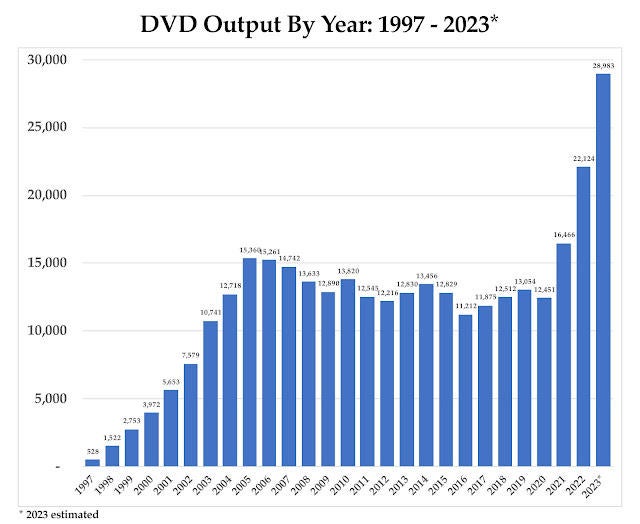There will be more widely available DVD and Blu-ray releases this year than in any other year since the inception of the format, according to Ralph Tribbey, founder and publisher of The DVD and Blu-ray Release Report. How is that possible in a media environment where virtually no streaming originals — an ever-growing chunk of the marketplace — are getting official releases? The answer is simple: unofficial releases. According to Tribbey’s estimates, more than 60% of the disc releases widely available online this year come from third party vendors selling bootleg discs on marketplaces like Etsy and eBay.
Videos by ComicBook.com
Obviously, that number is not a representation of units sold. It’s likely that most DVDs and Blu-rays bought by an end consumer are still legal releases. But when you look at the total number of titles released, huge swaths of content are being put on disc by pirates and sold to the public on the internet. In some cases, the buyers likely do not even know that they are buying a bootleg, because many of these discs look indistinguishible from a commercial release, especially in a thumbnail image.
According to the report, the total number of titles released in 2023 is on pace to be over 28,000 — that’s more than 5,000 more than last year…which is the current record-holder for the most titles ever released on disc. The number of titles has been creeping upwards since 2016, with the pandemic marking a big increase. Looking at a chart included in the story, it appears the high water mark for official releases was 2006, just prior to the release of the Blu-ray format. The numbers crept downward after that, before suddenly getting markedly higher beginning in 2021. You can see the chart below.

According to Tribbey’s breakdown, less than 2% of the titles he has tracked — a total of 201 releases — come from major studios and their affiliates. A further 12.5% come from independent labels, including boutique and specialty studios like educational and religious content. The report indicates that almost 20% of the releases come from “micro broadcasters” such as cable access, local government networks, and presumably things like YouTubers making their own releases. That leaves 66.44% coming from “helper” sources — e.g., sources that are creating custom content outside of the legitimate market. That’s a nice name for bootleggers, but it also likely encapsulates people who are creating discs based on public domain titles and other oddities.
There are a lot of factors driving these changes to the DVD and Blu-ray market. According to the report, local content like high school football games, concerts, and other events that schools and local media have legitimate copies of can contribute to the huge numbers of “micro-broadcast” releases. The market for those is pretty obvious, and most of them are short enough to fit on a DVD in high quality. Same with movies under 2 hours, and DVDs have a huge appeal because every optical video player can use them. Blu-rays are being used primarily for longer movies or TV shows — things where it costs less to make one Blu-ray than several DVDs.
On top of all of this, streaming shows, straight-to-streaming movies, oddities, rarities, and other items not available from legitimate vendors are filling up shelves at stand-alone websites and pop-up individual shops like Etsy alike. What seems to be happening is a general unwillingness by the studios to enforce their copyright on physical releases. Whether it’s lack of interest, the high cost of pursuing a defendant who will never be able to pay for their losses, or the sheer number of sellers involved, it appears as though Hollywood has generally decided that it’s not interested in stopping the flow of illegal discs.
With so many streaming projects being pulled, and some being written down for taxes, it seems like criminal prosecution is the only way those titles in particular will be stopped. After all, it seems like it would be hard for a studio to collect civil penalties on a movie that they are legally barred from making money on. And even if they could, that’s a lot of money spent on lawyers for little or no guaranteed upside.








